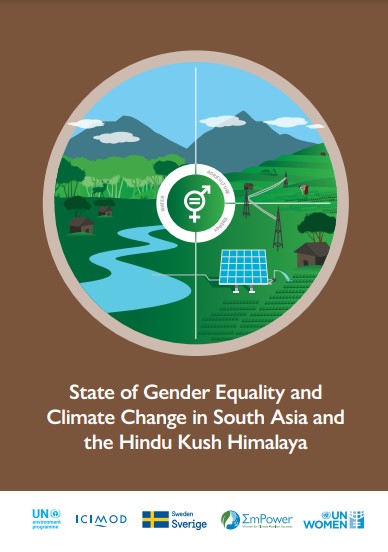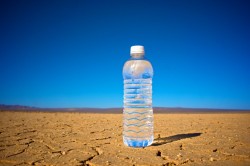Environment

Climate change and its impacts have put women and girls in a more vulnerable position, limiting their adaptive capacities in Nepal and other countries in South Asia and the Hindu Kush Himalaya regions, recent research suggests.
All 10 countries in the region share climate change as a central agenda but fail to implement policies that are sound in principle. That, in turn, further increases vulnerability to climate change, says the report titled ‘State of gender equality and climate change in South Asia and the Hindu Kush Himalayan Region’
The report was jointly launched by the International Centre for Integrated Mountain Development (ICIMOD), UN Women, and the UN Environment Programme (UNEP) in Kathmandu, the past week.
In addition to gender inequality, the report says that climate change has further compounded issues of food insecurity and poverty – some of the root causes of increasing vulnerability to climate change.
It suggests using existing regional platforms and creating new ones for cross-country learning and sharing of best practices related to gender-responsive climate policies and initiatives, according to a press release issued by ICIMOD.
Important regional platforms such as the South Asian Association for Regional Cooperation (SAARC) and the Bay of Bengal Initiative for Multi-Sectoral Technical and Economic Cooperation (BIMSTEC) can effectively promote inclusive development and address gender and social inequalities for achieving climate resilience in the region.
The report provides a comprehensive analysis of the gender dimensions of climate change in three key climate-affected sectors of agriculture, water, and energy in 10 countries – Afghanistan, Bangladesh, Bhutan, China, India, Maldives, Myanmar, Nepal, Pakistan, and Sri Lanka – in South Asia and the Hindu Kush Himalaya (HKH).
"South Asia and the HKH are among the regions that are most vulnerable to the impacts of climate change, with the aggravated impacts becoming more evident in the scale and increased incidence of climate-related disasters in recent years,” the report says, adding that that climate change can aggravate pre-existing social and gender inequalities.
In her opening remarks at the launch, Izabella Koziell, Deputy Director General, ICIMOD, said: “All of us have a very important role to play in making the voices of girls, women, and other marginalised groups heard so that actions are real, and progress is tangible.”
Climate change could widen existing gender gaps mainly due to women’s limited access, control, and ownership over resources, participation in decision-making, and freedom of choice determined by patriarchal values and social norms, the report says.
It underlines the need to address these gendered vulnerabilities and recognise the prevalence of patriarchal systems that hinder women’s roles and agency in adaptation and mitigation in most South Asian and HKH countries.
"In addition to gender inequality, climate change has also further compounded issues of food insecurity and poverty – some of the root causes of increasing vulnerability to climate change," it says.
On gender equality and climate policies, the report says, all ten countries in these regions are transitioning to low-emission development pathways that integrate mitigation and adaptation solutions across sectors, including water, energy, and agriculture. "They have committed to limit global warming to 1.5 degrees Celcius and reach zero emissions by the middle of the century."
Although climate change is a central agenda, the report finds inadequate integration of gender concerns in climate change policies, laws, institutional frameworks, and sectoral policies and programmes – and failure to implement policies that are sound in principle.
Regional Coordinator, Climate Change for Asia and the Pacific Office, UNEP, Mozaharul Alam, said: “To move from commitment to actual implementation, countries need evidence, data, and support to reach the goals of the Paris Agreement and achieve gender equality in the context of climate change."
The report suggests using existing regional platforms and creating new ones for cross-country learning and sharing best practices related to gender-responsive climate policies and initiatives.
Important regional platforms such as the South Asian Association for Regional Cooperation (SAARC) and the Bay of Bengal Initiative for Multi-Sectoral Technical and Economic Cooperation (BIMSTEC) can effectively promote inclusive development and address gender and social inequalities for achieving climate resilience in the region.
Based on the findings, the report puts forward national-level recommendations and guidelines to integrate gender equality effectively and social inclusion (GESI) concerns to address differential vulnerabilities in a changing climate. The assessment also suggests sector-specific recommendations for mainstreaming GESI in policies and implementation in the agriculture, water, and energy sectors.
Maria Holtsberg, Deputy Regional Director, Officer-in-Charge, UN Women, expressed hope that “the report will serve as a guide to developing innovative solutions and re-envisioning a future that puts women and the most marginalised groups at its core, drawing on their knowledge, capacities, and aspirations.”
The report was developed under the EmPower – Women for Climate Resilient Societies project jointly implemented by UN Women and UNEP and funded by the Swedish International Development Cooperation Agency.






